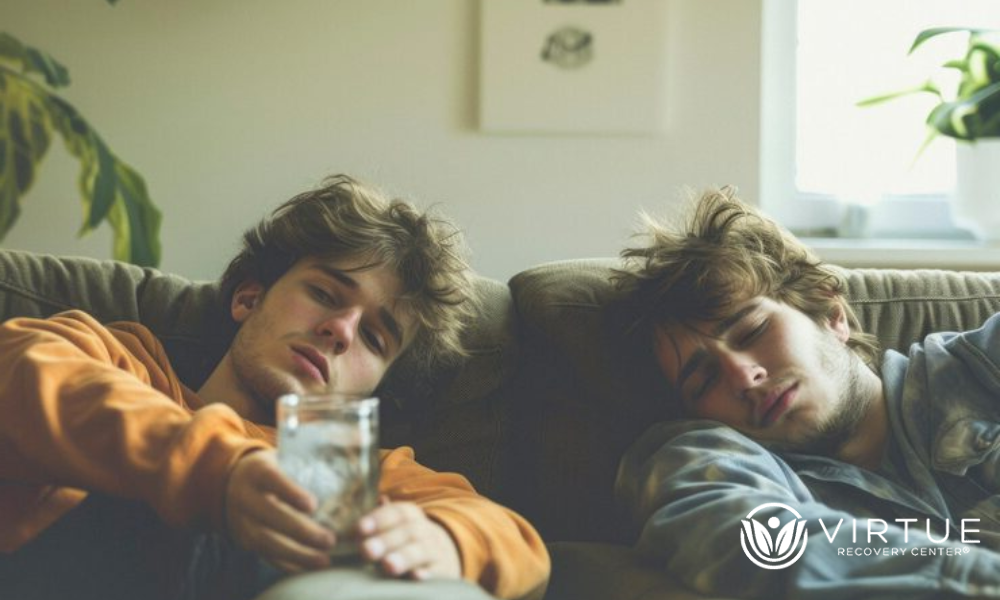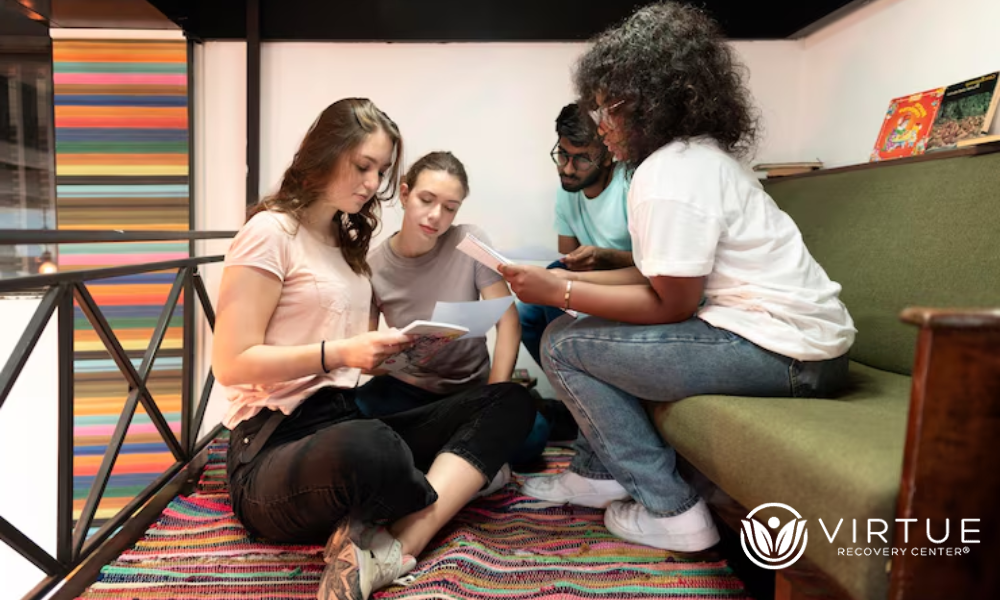Key Takeaways
- Drug addiction treatment programs that are developed exclusively for LGBTQ+ persons fulfill their unique social, emotional, and health needs.
- MDMA, GHB, ketamine, and methamphetamine are substances that are often used at clubs and may be highly dangerous for your body and mind.
- Care environments that are accessible to everyone help people become involved, build trust, and get better care.
- With the help of specialist treatment, people may cope with trauma, internalized stigma, and mental health problems all at the same time.
- You need a combination of medical care, rehabilitation, and aid from your community to get well.
Introduction
In recent years, the intersection of drug treatment and LGBTQ+ healthcare has become increasingly recognized as a priority. Research from the U.S. National Institutes of Health shows that MDMA, GHB, ketamine, and methamphetamine are all club drugs that can be especially harmful due to their prevalence in nightlife and party settings. These substances are nasty for the body, induce mental health issues, and make individuals reliant on them.
When LGBTQ+ people strive to get well, they often have to cope with more than just the medications’ effects on their bodies. They frequently have to cope with deep-seated issues like trauma, prejudice, and stigma that are linked to who they are. This is why specialized drug addiction treatment is so necessary: it helps people cope with both the physical impacts of drugs and the real-life problems that make it harder for them to get well.
Why Do Club Drugs Have A Specific Effect On The LGBTQ+ Community?
People often use club drugs in areas where there is a lot of energy, such as nightclubs, music festivals, and LGBTQ+ pride events. People may feel like they belong in these areas, but they may also make drug usage appear normal. These are some of the most common club drugs in this area:
- MDMA (Ecstasy/Molly): People say it makes them feel more connected and aware of their surroundings, but it may also make them melancholy, dehydrated, and have low serotonin levels.
- GHB: People take it for pleasure and as a “date-rape” drug. It may cause you to pass out and stop breathing.
- Ketamine: A drug that might make you forget things and cause difficulties with your bladder.
- Methamphetamine: Incredibly addictive and hurts the brain and body in awful ways.
Having these drugs along with prescription drugs or alcohol may make the adverse effects worse, which can sometimes lead to fatal overdoses. As research on poly-club-drug use among gay and bisexual men notes, these patterns of use carry unique health risks.
What Is Unusual About Meth Addiction Treatment For LGBTQ+ People?

Meth is one of the most addictive and hazardous club drugs. LGBTQ+ persons who have meth addiction often get therapy that includes:
- Medical detoxification: a safe technique to get rid of withdrawal symptoms.
- Trauma-informed therapy: addressing both addiction and trauma that happened in the past or is now happening.
- HIV/STI care coordination: because having sex while drunk or high makes you more likely to get an infection.
- Peer support groups, offered by or for LGBTQ+ persons, help them get to know and trust each other.
People who join LGBTQ-inclusive recovery programs can share their experiences without worrying that others will condemn them. People are far more likely to remain with their treatment and get better over time if they feel comfortable.
Is Crack Worse Than Meth?
A common question in addiction education is whether crack cocaine or methamphetamine is more harmful. Both of these drugs are pretty deadly, but they function on the brain in different ways and have distinct chemical structures.
Crack cocaine is a drug that is created from powdered cocaine and smoked to provide a rapid and intense high. Because it doesn’t last long, many people use it frequently and become hooked quickly. Crack may make you paranoid and cause you heart attacks and strokes.
Methamphetamine is an artificial drug that keeps you awake for an extended period. This may lead to binges that last for days. Meth causes “meth mouth,” which is severe tooth rotting, memory problems, and acute psychosis.
People who use crack tend to use it more regularly but for shorter amounts of time. Meth, on the other hand, has effects that linger longer and hurt the brain more, which might make things worse over time. In any case, acting quickly is quite vital.
What Role Does Drug Addiction Therapy That Incorporates Everyone Play?

Standard ways of helping individuals get well may not work for LGBTQ+ persons. Therapy programs that are available to everyone:
- Find therapists who are knowledgeable about other cultures and understand the issues LGBTQ+ persons confront with their identities.
- Create safe venues where people may talk about their prejudices.
- Include therapy for depression, anxiety, PTSD, and other disorders that occur at the same time in mental health care.
- Encourage your family or close friends to go to therapy to help them build healthy support networks again.
Drug addiction treatment combined with identity-affirming care makes the recovery process last longer and become more effective.
Planning For Long-Term Healing After Going To Rehab
The first step is to complete treatment. Here are some things that happen during continuing rehabilitation:
- More therapy sessions, both one-on-one and in groups, are part of aftercare programs.
- Sober social gatherings are a method to fit in without drinking or taking drugs.
- If you want to prevent relapsing, you need to figure out what makes you want to use drugs again, come up with techniques to cope with those cravings, and set up systems to keep you responsible.
- Engage in the community by volunteering, speaking out, or finding unique ways to make your life meaningful.
To get over an addiction, you need to do more than just stop taking drugs. You also need to change your life in a way that is good for your mental, emotional, and physical health.
Conclusion
Club drugs may harm your health, relationships, and sense of self, especially for LGBTQ+ persons who may already have challenges in society. Specialized drug addiction treatment clinics that provide everything recognize that everyone has a distinct way to get well. These programs genuinely help individuals get well by dealing with the physical dangers of drugs, the emotional pain of stigma, and the need for community.
At Virtue Recovery Center, Killeen, we provide therapy that is founded on science and supports people’s identities for those who have been harmed by club drugs, methamphetamine, and other substances that are addictive. Our programs, from club drugs to alcohol addiction rehab to are designed to help our clients regain their health, confidence, and sense of belonging. To begin your journey to long-term recovery, call us right now at 866-843-0545.
How Can Drug Addiction Treatment Support LGBTQ+ Individuals with a Family History of Addiction?
Drug addiction treatment for LGBTQ+ individuals is crucial, especially for those with a family history of addiction. Specialized support systems create an affirming environment, addressing unique challenges and fostering resilience. Tailored therapies can help break the cycle of addiction, promoting healing and empowerment within this community while recognizing their specific needs.
FAQs
What are the most popular club drugs for LGBTQ+ people?
Some of the most common substances include MDMA, GHB, ketamine, and methamphetamine. People usually use them at night and during gatherings.
How does meth addiction therapy help LGBTQ+ clients in particular?
It covers the unique needs of LGBTQ+ persons by integrating medical detox, trauma-informed care, peer support, and coordinating HIV and STI treatment.
Is crack more addictive than meth?
Both are incredibly addictive, but methamphetamine is usually worse for you over time since it lasts longer and has a more substantial impact on the brain.
Why do LGBTQ+ people need treatment that involves everyone?
It makes individuals feel safe and not judged, and it helps them cope with challenges that are specific to their identity. This allows them to become more active and recover.
What happens when you leave rehab?
To be clean for a long time, you need to obtain aftercare, stay away from drugs, join a sober community, and continue going to treatment.
Resources:
- Substance Use in Lesbian, Gay, and Bisexual Populations: An Update on Empirical Research and Implications for Treatment. PMC, U.S. National Institutes of Health, https://pmc.ncbi.nlm.nih.gov/articles/PMC3288601/.
- Experiences of and Recommendations for LGBTQ+-Affirming Substance Use Services: An Exploratory Qualitative Descriptive Study with LGBTQ+ People Who Use Opioids and Other Drugs. PMC, U.S. National Institutes of Health, https://pmc.ncbi.nlm.nih.gov/articles/PMC10491328/
- “Poly-Club-Drug Use among Gay & Bisexual Men.” PMC, U.S. National Institutes of Health, https://pmc.ncbi.nlm.nih.gov/articles/PMC1945225/.
- About the Author
- Latest Posts
Gigi Price holds licenses as a Master Social Worker and Clinical Drug Counselor. She completed her master’s degree in Social Work at Texas State University. Over the last decade, Gigi has been dedicated to utilizing evidence-based practices to enhance patient care and treatment planning, resulting in positive, long-term outcomes for patients and their families. Her passion lies in creating a treatment environment where professionals collaborate to bring about positive change and provide a safe, trustworthy therapeutic experience. Patients can be confident in receiving top-quality care under her leadership.
In her role as the Clinical Director of Virtue Recovery Houston, Gigi conducted research to identify the most effective approaches for treating patients with acute mental health diagnoses, PTSD, and Substance Use Disorder. She then assembled a team of skilled clinicians who could offer various therapeutic modalities, such as Cognitive Behavioral Therapy (CBT), Dialectical Behavioral Therapy
(DBT), Acceptance and Commitment Therapy (ACT), Somatic Exposure, Eye Movement Desensitization and Reprocessing (EMDR), and Cognitive Processing Therapy (CPT). Gigi takes pride in overseeing the development and implementation of Virtue Houston’s Treatment Program, which includes two specialized therapeutic curricula tailored to the unique needs of individuals struggling with mental health issues, addiction, and PTSD.









